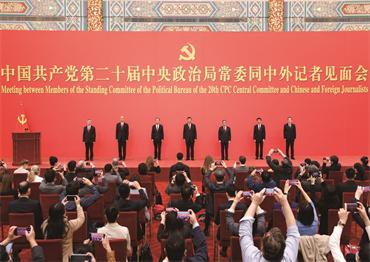Despite the triumphant and confident tone adopted by the report, it also highlighted the “difficulties and challenges on the road ahead.” In reviewing the Party’s work in the past five years, the report said China had been “confronted with drastic changes in the international landscape.”
“We have maintained firm strategic resolve and shown a fighting spirit,” and have “safeguarded China’s dignity and core interests,” Xi told the congress. Looking into the future, the report noted that China has “entered a period of development in which strategic opportunities, risks and challenges are concurrent and uncertainties and unforeseen factors are rising.”
Given this, the report said that Party members must “be more mindful of potential dangers, be prepared to deal with worst-case scenarios, and be ready to withstand high winds, choppy waters, and even dangerous storms.”
With such warnings, the work report features an entire section on the concept of “national security.” Declaring that national security is “the bedrock of national rejuvenation,” the report said that the CPC will take a “holistic” approach to promoting national security in all areas and stages of the work of the Party and the country.
“We will ensure the security of food, energy, and resources as well as key industrial and supply chains,” and “protect the lawful rights and interests of Chinese citizens and legal entities overseas,” Xi said.
China opposes protectionism, the erection of “fences and barriers,” decoupling, disruption of industrial and supply chains, unilateral sanctions, and maximum-pressure tactics, according to the report.
On the Taiwan question, the report largely reiterated its position stated in a white paper on Taiwan released in August 2022. China will strive for peaceful reunification “with the greatest sincerity and the utmost effort,” but will “never promise to renounce the use of force, and “reserve the option of taking all measures necessary.” said the report. “This is directed solely at interference by outside forces and the few separatists seeking ‘Taiwan independence’ and their separatist activities; it is by no means targeted at our Taiwan compatriots,” Xi said in the report.
Put together, the report of the 20th Party congress injects a deeper sense of urgency and expresses stronger determination and confidence for the central leadership to lead the Party and the country to achieve its goals.
On October 22, the congress issued a resolution, which formally adopted the work report as “a political declaration and a program of action for the Party to bring together the Chinese people of all ethnic groups and lead them in securing new success for socialism with Chinese characteristics.”
In his speech delivered on the last day of the congress on October 22, Xi said the meeting has realized its goals of “unifying thinking, fortifying confidence, charting the course and boosting morale as the Party has embarked on a new journey to face new tests. “We are fully confident and capable of creating new and even greater miracles on the new journey of the new era,” Xi said.

 Old Version
Old Version
